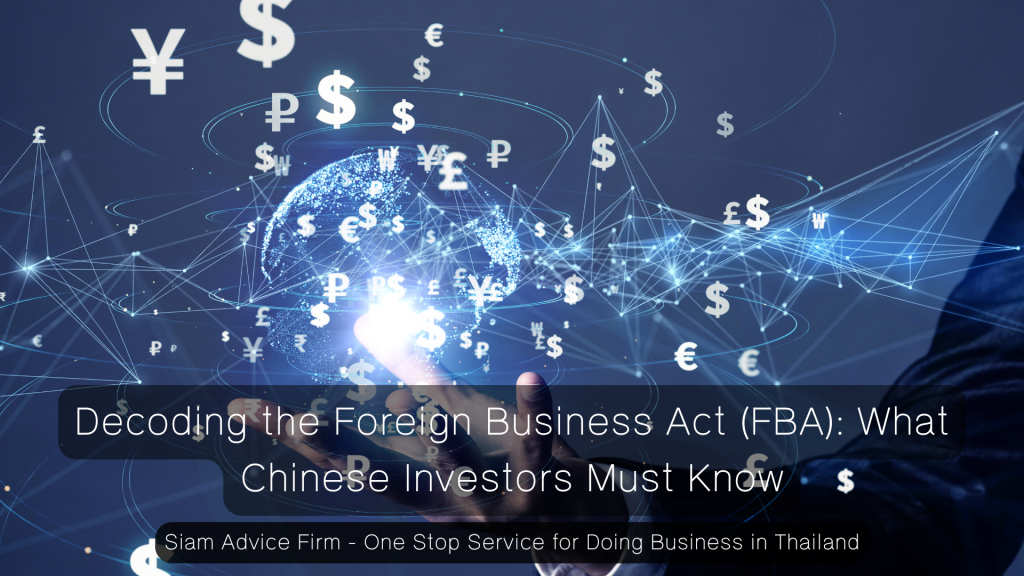
For any foreign investor, achieving a clear, secure, and legally sound foundation is the first step toward long-term success in Thailand. Yet, many encounter a significant legal hurdle that can seem complex and restrictive: the Foreign Business Act.
This powerful piece of legislation is often the root cause of the most common challenges investors face, from ownership limitations to the dangerous temptation of using illegal nominee structures. Understanding its core principles is not just a legal formality—it is an essential strategic requirement.
This guide will decode the Foreign Business Act (FBA), B.E. 2542 (1999) into simple, understandable terms. We will clarify its purpose, explain its restrictions, and illuminate the legal pathways available to ensure your business is structured for both control and compliance from day one.
The Guardian of Thai Industries: What is the FBA?
The Foreign Business Act is the primary law governing foreign participation in the Thai economy. Its main purpose is to protect specific Thai industries and ensure that foreign investment aligns with the country’s national development goals.
For most Chinese investors, the FBA’s most critical and immediate impact is its restriction on corporate ownership. The law defines a company as “foreign” if 50% or more of its shares are held by non-Thai individuals or entities. Such “foreign” companies are restricted from operating in many business sectors unless they receive specific permission. This 49% foreign ownership limit is the central challenge that investors must legally and strategically navigate to secure control of their enterprise.
The Three Lists: A Simple Breakdown
The FBA categorizes all business activities into three lists, each with different levels of restriction. Identifying where your intended business falls is the first step in determining your legal pathway.
List 1: Strictly Prohibited
These are businesses that foreigners are completely forbidden from engaging in for special reasons. This list is short and specific, including activities like:
- Newspaper and radio/television broadcasting
- Rice farming and livestock farming
- Forestry and timber processing from natural forests
- Trading in Thai antiques or historical artifacts
List 2: Businesses Requiring Cabinet Approval
This list covers businesses related to national safety, security, arts, culture, and natural resources. Foreign participation is possible but requires a license from the Minister of Commerce with prior approval from the Thai Cabinet—a high-level and often difficult process. Examples include:
- Production and distribution of firearms and explosives
- Domestic land, water, or air transportation
- Mining and sugar production from sugarcane
List 3: Protected Thai Commerce
This is the most relevant list for the majority of foreign investors. It covers industries where Thai nationals are not yet deemed ready to compete on an equal footing. To own 50% or more of a business on this list, a foreigner must obtain a Foreign Business License (FBL). This broad category includes:
- Construction (with some exceptions)
- Retail and wholesale businesses (with certain capital exceptions)
- Advertising businesses
- Hotels and restaurants
- Most “other service businesses” not specified elsewhere
The Two Legal Keys to Unlock the FBA
While the FBA seems restrictive, it provides two primary, fully legal methods for foreign investors to operate with majority or even 100% ownership.
Key #1: The Board of Investment (BOI) Promotion
This is the most powerful and widely used key. For businesses in eligible activities (often manufacturing, technology, and other strategic sectors), receiving a promotion certificate from the Board of Investment (BOI) provides a direct exemption from the FBA’s ownership limits. This allows for 100% foreign ownership and is the most streamlined and secure pathway for qualified projects.
Key #2: The Foreign Business License (FBL)
For businesses that fall under List 3 but are not eligible for BOI promotion (e.g., many service businesses), the Foreign Business License (FBL) is the alternative key. The application is made to the Department of Business Development, and the process is a case-by-case review to determine the business’s benefits to Thailand. This path is generally more complex and time-consuming than a BOI application, making expert guidance crucial.
Why “Ignoring” the FBA is Your Biggest Risk
The restrictions imposed by the FBA are what lead some investors to consider the dangerous shortcut of using nominee shareholders. It is critical to understand that this practice is explicitly illegal under the FBA. The act contains severe penalties for any foreigner operating a restricted business without permission and for any Thai national who acts as their nominee.
The penalties are not trivial; they include imprisonment for up to three years, fines from 100,000 to 1,000,000 THB, or both. The court will also order a complete cessation of the business operations. This makes attempting to circumvent the FBA the single greatest threat to your investment.
(Read our complete guide on The Nominee Trap: Secure & 100% Legal Shareholder Structures)
Conclusion
The Foreign Business Act is not an insurmountable wall; it is a set of rules that must be understood and navigated with a clear strategy. Far from being a barrier, it creates a clear framework that, when followed correctly, leads to a secure, stable, and legally sound business structure.
Understanding where your business fits within the FBA’s three lists is the absolute first step in this strategic process. It determines whether you need a Thai partner, can apply for an FBL, or are eligible for the powerful benefits of a BOI promotion. Making this determination correctly from the outset protects you from risk and sets you on the proper path to success.